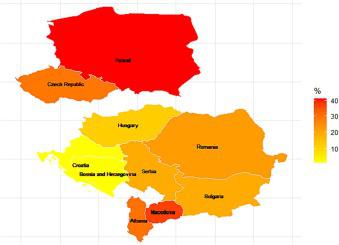当前位置:
X-MOL 学术
›
Journal of International Money and Finance
›
论文详情
Our official English website, www.x-mol.net, welcomes your feedback! (Note: you will need to create a separate account there.)
Trust in the central bank, financial literacy, and personal beliefs
Journal of International Money and Finance ( IF 2.762 ) Pub Date : 2024-03-19 , DOI: 10.1016/j.jimonfin.2024.103066 Mihai Niţoi , Maria-Miruna Pochea
Journal of International Money and Finance ( IF 2.762 ) Pub Date : 2024-03-19 , DOI: 10.1016/j.jimonfin.2024.103066 Mihai Niţoi , Maria-Miruna Pochea

|
This paper examines trust in the central bank across ten Central, Eastern and Southeastern European countries, using survey data collected from 61,398 individuals. Our results show that financially literate individuals are more likely to trust central banks. The association is stronger in countries with inflation targeting and flexible exchange rates regimes. Distrust in the central bank is associated with higher inflation expectations, savings in foreign currency or a preference for cash. Even when the sample is restricted to individuals with high inflation expectations, financial literacy remains associated with greater trust in the central bank. We find that trust in the central bank correlates negatively with financial inclusion but positively with wealth. Financially literate citizens express less trust in the government, which highlights that trust in the central bank is not entirely indicative of trust in the government. However, individuals who think that prices will rise and the local currency will depreciate distrust both the central bank and the government.
中文翻译:

对中央银行的信任、金融知识和个人信仰
本文利用从 61,398 名个人收集的调查数据,探讨了中欧、东欧和东南欧 10 个国家对央行的信任度。我们的结果表明,具有金融知识的个人更有可能信任央行。在实行通胀目标制和灵活汇率制度的国家,这种联系更为紧密。对央行的不信任与较高的通胀预期、外币储蓄或对现金的偏好有关。即使样本仅限于高通胀预期的个人,金融知识仍然与对央行的更大信任相关。我们发现,对央行的信任与金融包容性呈负相关,但与财富呈正相关。具备金融知识的公民对政府的信任度较低,这凸显出对央行的信任并不完全表明对政府的信任。然而,认为物价会上涨、本币会贬值的个人对央行和政府都不信任。
更新日期:2024-03-19
中文翻译:

对中央银行的信任、金融知识和个人信仰
本文利用从 61,398 名个人收集的调查数据,探讨了中欧、东欧和东南欧 10 个国家对央行的信任度。我们的结果表明,具有金融知识的个人更有可能信任央行。在实行通胀目标制和灵活汇率制度的国家,这种联系更为紧密。对央行的不信任与较高的通胀预期、外币储蓄或对现金的偏好有关。即使样本仅限于高通胀预期的个人,金融知识仍然与对央行的更大信任相关。我们发现,对央行的信任与金融包容性呈负相关,但与财富呈正相关。具备金融知识的公民对政府的信任度较低,这凸显出对央行的信任并不完全表明对政府的信任。然而,认为物价会上涨、本币会贬值的个人对央行和政府都不信任。



























 京公网安备 11010802027423号
京公网安备 11010802027423号